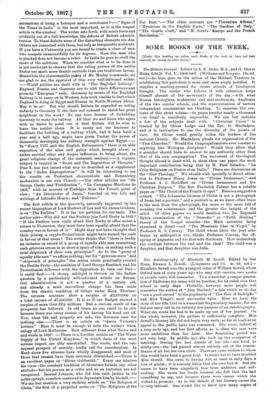The Autobiography of Elizabeth M. Sewell. Edited by her Niece,
Eleanor L. Sewell. (Longmans and Co. 4s. 6d. net.)— Elizabeth Sewell was the youngest sister of William Sewell, whom Oxford men of sixty years ago who may still survive, ran nantes in gurgite vasto, will remember. To a somewhat younger genera- tion of Radleians his name will be familiar, for lie ruled over that school in early days. Probably, however, more people will remember the author of "Amy Herbert," a tale which in its day "ran a good second" to the popularity of "The Heir of Redclyffe " and Miss Yonge's most successful tales. Here we have the story of her life, told in a somewhat fragmentary manner, for she did not carry out in its entirety her purpose of an autobiography. What she wrote has had to be made up out of her journal. On the whole, however, the picture is sufficiently complete. Miss Sewell's literary life did not begin very early, as far at least as an appeal to the public taste was concerned. She wrote, indeed, at a very early age, and her first efforts, as is often the case, were more ambitious than her later. Her flourishing period was not very long. In middle age she took up the occupation of teaching. During the last decade of her life—she lived to ninety-one—she had passed almost entirely out of the remem- brance of all but her own circle. There are some writers to whom this would have been a great trial. It seems not to have troubled Miss Sewell. She owns to having felt, at least in early days, a love of praise ; it is scarcely likely that she ever lost it. But she seems to have been singularly free from ambition and self- seeking. She wrote her books because she felt that she bad something to say, and because there were causes which she wished to promote. As to the details of her literary career she is very reticent. One would like to know how many copies of "Amy Herbert"—to mention her most popular book—were sold. About this work, indeed, more information than usual is given, for we learn that probably twenty thousand were circulated in Ainerica. But as these brought nothing to the author, this piece of statistics scarcely counts. One conscientious publishing house in the States "improved " the book by "expurging the part on baptism," but their conscience did not go so far as payment.











































 Previous page
Previous page